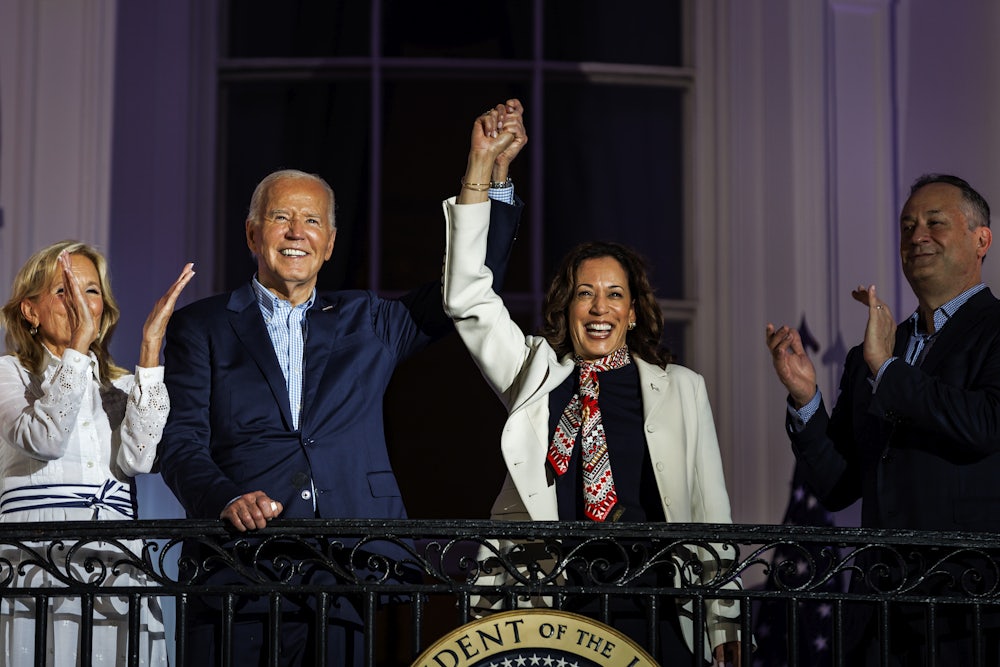Democrats, for the first time in weeks, have momentum. Kamala Harris has clinched the nomination. Democratic voters are overwhelmingly supportive of her candidacy. She raised $231 million in 24 hours, and just held the biggest rally of the entire campaign. Democrats are energized, unified, and hopeful. There’s an immense outpouring of gratitude to President Biden for passing the torch. And every Democrat can and should feel justifiable pride in our party, which for once actually behaved like a political party—rather than a platform for the ambitions of its individual leaders—by taking action to maximize its chances of electoral success.
Looking backward feels counterproductive at the moment. Between now and November 5, our overwhelming priority needs to be doing everything we can to defeat Donald Trump. But given how close the party came to driving headlong off a cliff—and given how vociferously many Democrats worked to try to prevent the candidate switch that has now energized our party—at some point we will need to have a conversation about how we reached this point. And ultimately Democrats should draw at least one lesson from recent events without marring our newfound party unity: Listen to the people.
The reset we’ve all joyfully experienced in the last few days did not come out of nowhere. There has been an immense amount of quantitative, qualitative, and anecdotal evidence demonstrating an unprecedented well of pent-up energy for a new Democratic nominee. As commentators like Ezra Klein have described in detail, at no point over the past year has the demand for Biden to pass the torch been driven by elites. On the contrary, Democrats’ postdebate freakout was the shock that caused a broad coalition of party elites to catch up with where voters have been for some time and finally acknowledge that, yes, it was time for Biden to step aside.
As someone who was a vocal participant in the push for Biden to pass the torch, I want to be clear that I was as late to this conclusion as anyone. I remember clearly a conversation last summer with a friend in Rhode Island, a small-business owner who had formerly served as a Democratic member of her small town council and whom I’d never heard say a bad word about anyone. So I was caught off guard when she told me in uncharacteristically pointed terms something to the effect of, “Have you seen Biden lately? The man is ancient; it’s ridiculous. Move on, make room for someone new.” I remember smiling and nodding and trying to change the topic because I just didn’t yet feel that kind of visceral concern about his age.
My mind went racing back to that exchange, in the first moments of the June 27 debate. “Holy shit, she was right,” I thought to myself. “We need a new nominee.” Later that night I started looking at the data—polling, surveys, and other expert analysis—showing that most voters were, like my friend, worried about Biden’s deterioration and desperate for another option in the presidential race.
That’s what informed my own decision to start organizing for Biden to pass the torch, and what made me confident that if Biden did the right thing and stepped aside, the party would experience a rush of energy and resources from the vast ranks of Democrats who have long been ready to support someone new.
What explains the dividing line between Democrats who saw the debate and started urging a switch and those who circled the wagons all the more ferociously? Many Democrats, including elected officials, party officers, labor leaders, and influencers, promised that replacing Biden would lead to chaos and disunity. Some of these folks may merely be cult-of-personality pushers, like the big online accounts that spent the last three weeks cynically comparing the pass-the-torch movement to the January 6 insurrection and arguing—somehow with a straight face—that the push to replace an old white man with a strong Black woman was racist. Others were just cowards, like the many Democratic leaders who, according to ubiquitous reporting, perfectly understood the threat that Biden’s continued candidacy represented yet refused to speak out, preferring passive defeat. “We’ve all resigned ourselves to a second Trump presidency,” one senior House Democrat, bafflingly, told Axios.
But many of those insisting that Biden had to remain were, I think, doing so genuinely. They believed their own arguments about how disastrous a transition would undoubtedly be, more so than they believed the clear evidence available to them that most voters were not on the same page.
Their mistake, then, was in not listening to the people. The folks who got this right—who understood both that Biden was a genuine danger for Democrats if he remained at the top of the ticket and that replacing him with Vice President Harris could give us a massively energizing reset—were the people who said, Let’s look at what the voters want and act accordingly. The folks who got this wrong were those who said, The voters don’t get it, and we must stay the course.
We often lose sight of the fact that democracy is supposed to be about giving the people what they want. Democracy, at its core, is a system that trusts that when a strong majority makes its wishes heard, our leaders should pay attention. Too often our government—and yes, our party—doesn’t do that.
In this instance, that inclination very nearly led us to catastrophe. Because while it feels almost inevitable now that Harris would take Biden’s place and everything would work out for the best, for weeks—as the president dug in, party officials circled the wagons, and the DNC moved to schedule an early virtual roll call vote to lock in Biden’s nomination—this resolution seemed far from assured. Indeed, for a while it seemed possible, or probable even, that Democrats would inescapably tie ourselves to a path that was likely to end with a fascist takeover in November.
Given the narrowness of our escape, it feels important—perhaps existentially so—that at some point we reflect on what we must do, as a party, to make sure we don’t come anywhere near that cliff’s edge ever again. While many books could undoubtedly be written on this topic, I’d argue that it ultimately comes down to a simple takeaway: Listen to the voters. The people were right about Biden before the politicians were. In the future they’re going to be right about other critical issues before the politicians too.
If Kamala Harris can incorporate that lesson into her campaign, I think we’ve got a great chance to win this thing.








